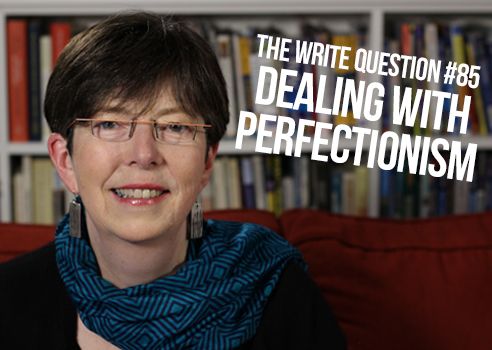Viewing time: 4 mins. 44 secs.
The Write Question is a weekly video podcast all about writing. Today’s question is about perfectionism for writers. If you have a question you’d like me to answer you can email me at daphne@publicationcoach.com, tweet me @pubcoach, or leave a message for me at the Skype account, The Write Question.
Transcript:
Welcome to The Write Question, I’m Daphne Gray-Grant and my topic today is about perfectionism and writers.
I have a question from Munis Topcuoglu, a writer based in Toronto, Ontario. Here’s what he’s asked:
“I’m a perfectionist and I’m always looking for ways to improve. What can you suggest that I do?”
Thanks for your question, Munis. People often use labels like “perfectionist” or “undisciplined” to describe themselves and to explain why they are unable to write.
I don’t know if you will consider this good news or bad, but I don’t buy those labels. Or at least I don’t see them as particularly helpful. Let me explain why.
As the name suggests, most perfectionists want their work to be perfect — without errors, right? But, let’s ask the next obvious question. Why do they want their writing to be this way?
I believe people who desire this outcome sometimes want to suppress worries about their own incompetence. Other times, they seek perfection because they haven’t had enough writing success (as measured by either sales or praise) and they hope a perfect piece of writing will solve the problem.
But one of the world’s leading researchers on motivation holds a more nuanced view. Piers Steel, a professor at the University of Calgary’s school of business, does not believe that perfectionism delays many writers. Instead, in his compelling book, The Procrastination Equation — link below — he argues that the bigger barrier to writers is procrastination, which he argues is sparked by impulsivity.
How does this feeling assert itself? Ask yourself these questions about how you behave when you’re writing:
- Do you check email every 10 minutes (or perhaps even more frequently)?
- Are you able to stay away from Facebook and Twitter?
- Can you turn off your phone while writing?
- Can you stop yourself from surfing the Internet?
- Does your mind wander to other projects?
- Do you find yourself jumping up to react to interruptions?
All of these tasks are impulsive. So instead of labeling yourself a “perfectionist,” consider whether you’re impulsive. If you can deal with that feeling, I suspect that your apparent perfectionism will likely disappear.
Here are 7 tips for dealing with impulsivity:
- Get yourself organized. Before you begin writing, organize your office, cubicle, or desk. (That said, don’t allow this organizational project become an excuse to procrastinate. Just clear a surface for yourself — sweep material into a box if necessary — and sort it later.
- Set priorities. If everything is important, nothing is. Experiment with various types of “to do” software until you find one that works for you. (I like the digital Wunderlist, which is free and easy to use. Trello is another no-charge piece of software for organizing.) Links are below.
- Change your email settings to “pick up manually.” Don’t ever allow email to control your day.
- Give yourself a word-count or time-related goal for writing.
- If other, non-relevant ideas keep popping into your head — while you’re writing— 5. them down on a piece of paper. You can always think about them later.
- If you find yourself wasting endless hours on Twitter or Facebook when you should be writing, Self-Control (Mac) or Freedom (PC) may be apps that will help you. See links below. Set them for one hour, and the software will restrict you from social media for 60 minutes. A computer reboot will not help. (Although you can whitelist specific sites if you like.)
- Consider developing a practice that will help you control your own impatience, not just for writing, but for the rest of your life as well. I think meditation is really good for that and I include a link to my blog post on that topic below.
Finally, let me wrap up with a quote from Piers Steel: “Procrastination is part of our human nature and almost everybody does it.”
Thanks for the question, Munis! If you’re confusing procrastination with perfectionism, I encourage you to read Piers Steel’s book. Both those words begin with the letter P but I think if you focus on the one ending in -crastination, you’ll find yourself becoming a more successful writer.
Links:
Self-Control (Mac)
Freedom (PC)
An earlier version of this post first appeared on my blog on Feb. 15/19.


